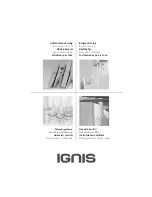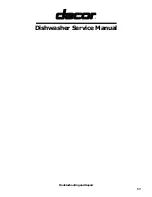
31
Maintenance
■
The washing drum
■
Cleaning your washer
■
Cold conditions
•
If you live in a hard water area, limescale may build up continuously in places where it cannot be seen
and thus not easily removed. Over time the build up of scale clogs appliances, and if it is not kept in
check these may have to be replaced.
•
Although the washing drum is made of Stainless steel, specks of rust can be caused by small metal
articles (paper clips, safety pins) which have been left in the drum.
•
The washing drum should be cleaned from time to time.
•
If you use descaling agents, dyes or bleaches, make sure they are suitable for washing machine use.
•
Descaler may contain chemicals that may damage part of your washing machine.
•
Remove any spots with a stainless steel cleaning agent.
•
Never use steel wool.
•
Proper care of your washer can extend its life.
•
The outside of the machine can be cleaned with warm water and a neutral non abrasive household
detergent.
•
Immediately wipe off any spills. Wipe with damp cloth.
•
Try not to hit surface with sharp objects.
•
Do not use methylated spirits, diluents or similar products.
•
Dry around the washer door opening, flexible gasket and door glass.
•
Run washer through a complete cycle using hot water.
•
Repeat process if necessary.
▶
Exterior
▶
Interior
•
To remove hard water deposits, use only cleaners labelled washer safe.
NOTE
If the washer is stored in an area where freezing may occur or moved in freezing temperatures, follow
these instructions to prevent damage to the washer:
•
Turn off water supply tap.
•
Disconnect hoses from water supply and drain water from hoses.
•
Plug electrical cord into a properly grounded electrical outlet.
•
Add 1 gallon (3.8 L) of nontoxic recreational vehicle(RV) antifreeze into an empty wash drum. Close
the door.
•
Set spin cycle and let washer spin for 1 minute to drain out all water. Not all of the RV antifreeze
will be expelled.
•
Unplug electrical power cord, dry the drum interior, and close the door.
•
Remove dispenser drawer, drain and dry excess water from the compartments.
•
Store washer in an upright position.
•
To remove antifreeze from washer after storage, run empty washer through a complete cycle using
detergent. Do not add wash load.










































